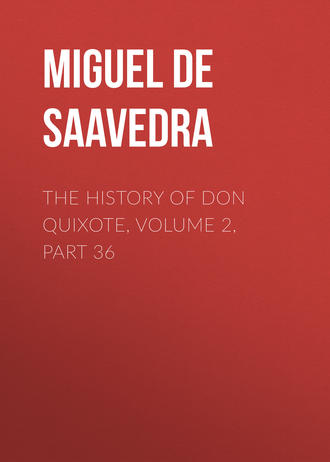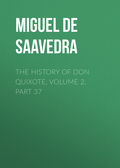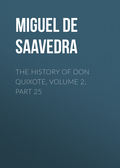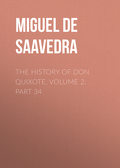
Мигель де Сервантес Сааведра
The History of Don Quixote, Volume 2, Part 36
And now day dawned; and if the dead freebooters had scared them, their hearts were no less troubled by upwards of forty living ones, who all of a sudden surrounded them, and in the Catalan tongue bade them stand and wait until their captain came up. Don Quixote was on foot with his horse unbridled and his lance leaning against a tree, and in short completely defenceless; he thought it best therefore to fold his arms and bow his head and reserve himself for a more favourable occasion and opportunity. The robbers made haste to search Dapple, and did not leave him a single thing of all he carried in the alforjas and in the valise; and lucky it was for Sancho that the duke's crowns and those he brought from home were in a girdle that he wore round him; but for all that these good folk would have stripped him, and even looked to see what he had hidden between the skin and flesh, but for the arrival at that moment of their captain, who was about thirty-four years of age apparently, strongly built, above the middle height, of stern aspect and swarthy complexion. He was mounted upon a powerful horse, and had on a coat of mail, with four of the pistols they call petronels in that country at his waist. He saw that his squires (for so they call those who follow that trade) were about to rifle Sancho Panza, but he ordered them to desist and was at once obeyed, so the girdle escaped. He wondered to see the lance leaning against the tree, the shield on the ground, and Don Quixote in armour and dejected, with the saddest and most melancholy face that sadness itself could produce; and going up to him he said, "Be not so cast down, good man, for you have not fallen into the hands of any inhuman Busiris, but into Roque Guinart's, which are more merciful than cruel."
"The cause of my dejection," returned Don Quixote, "is not that I have fallen into thy hands, O valiant Roque, whose fame is bounded by no limits on earth, but that my carelessness should have been so great that thy soldiers should have caught me unbridled, when it is my duty, according to the rule of knight-errantry which I profess, to be always on the alert and at all times my own sentinel; for let me tell thee, great Roque, had they found me on my horse, with my lance and shield, it would not have been very easy for them to reduce me to submission, for I am Don Quixote of La Mancha, he who hath filled the whole world with his achievements."
Roque Guinart at once perceived that Don Quixote's weakness was more akin to madness than to swagger; and though he had sometimes heard him spoken of, he never regarded the things attributed to him as true, nor could he persuade himself that such a humour could become dominant in the heart of man; he was extremely glad, therefore, to meet him and test at close quarters what he had heard of him at a distance; so he said to him, "Despair not, valiant knight, nor regard as an untoward fate the position in which thou findest thyself; it may be that by these slips thy crooked fortune will make itself straight; for heaven by strange circuitous ways, mysterious and incomprehensible to man, raises up the fallen and makes rich the poor."
Don Quixote was about to thank him, when they heard behind them a noise as of a troop of horses; there was, however, but one, riding on which at a furious pace came a youth, apparently about twenty years of age, clad in green damask edged with gold and breeches and a loose frock, with a hat looped up in the Walloon fashion, tight-fitting polished boots, gilt spurs, dagger and sword, and in his hand a musketoon, and a pair of pistols at his waist.
Roque turned round at the noise and perceived this comely figure, which drawing near thus addressed him, "I came in quest of thee, valiant Roque, to find in thee if not a remedy at least relief in my misfortune; and not to keep thee in suspense, for I see thou dost not recognise me, I will tell thee who I am; I am Claudia Jeronima, the daughter of Simon Forte, thy good friend, and special enemy of Clauquel Torrellas, who is thine also as being of the faction opposed to thee. Thou knowest that this Torrellas has a son who is called, or at least was not two hours since, Don Vicente Torrellas. Well, to cut short the tale of my misfortune, I will tell thee in a few words what this youth has brought upon me. He saw me, he paid court to me, I listened to him, and, unknown to my father, I loved him; for there is no woman, however secluded she may live or close she may be kept, who will not have opportunities and to spare for following her headlong impulses. In a word, he pledged himself to be mine, and I promised to be his, without carrying matters any further. Yesterday I learned that, forgetful of his pledge to me, he was about to marry another, and that he was to go this morning to plight his troth, intelligence which overwhelmed and exasperated me; my father not being at home I was able to adopt this costume you see, and urging my horse to speed I overtook Don Vicente about a league from this, and without waiting to utter reproaches or hear excuses I fired this musket at him, and these two pistols besides, and to the best of my belief I must have lodged more than two bullets in his body, opening doors to let my honour go free, enveloped in his blood. I left him there in the hands of his servants, who did not dare and were not able to interfere in his defence, and I come to seek from thee a safe-conduct into France, where I have relatives with whom I can live; and also to implore thee to protect my father, so that Don Vicente's numerous kinsmen may not venture to wreak their lawless vengeance upon him."







